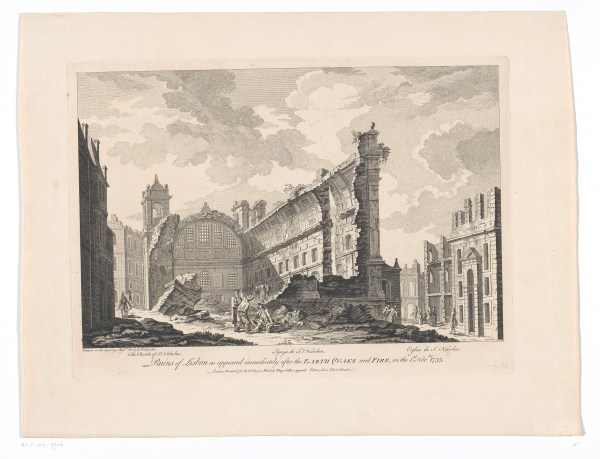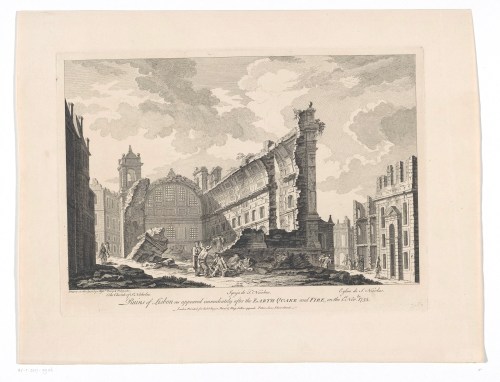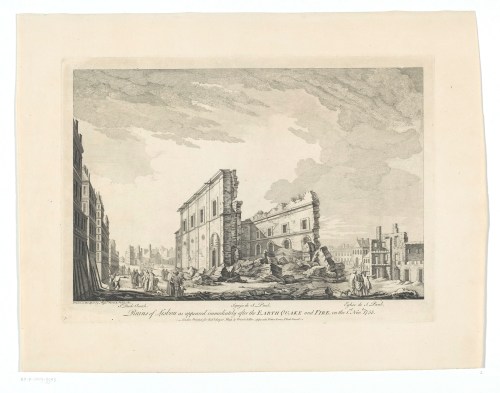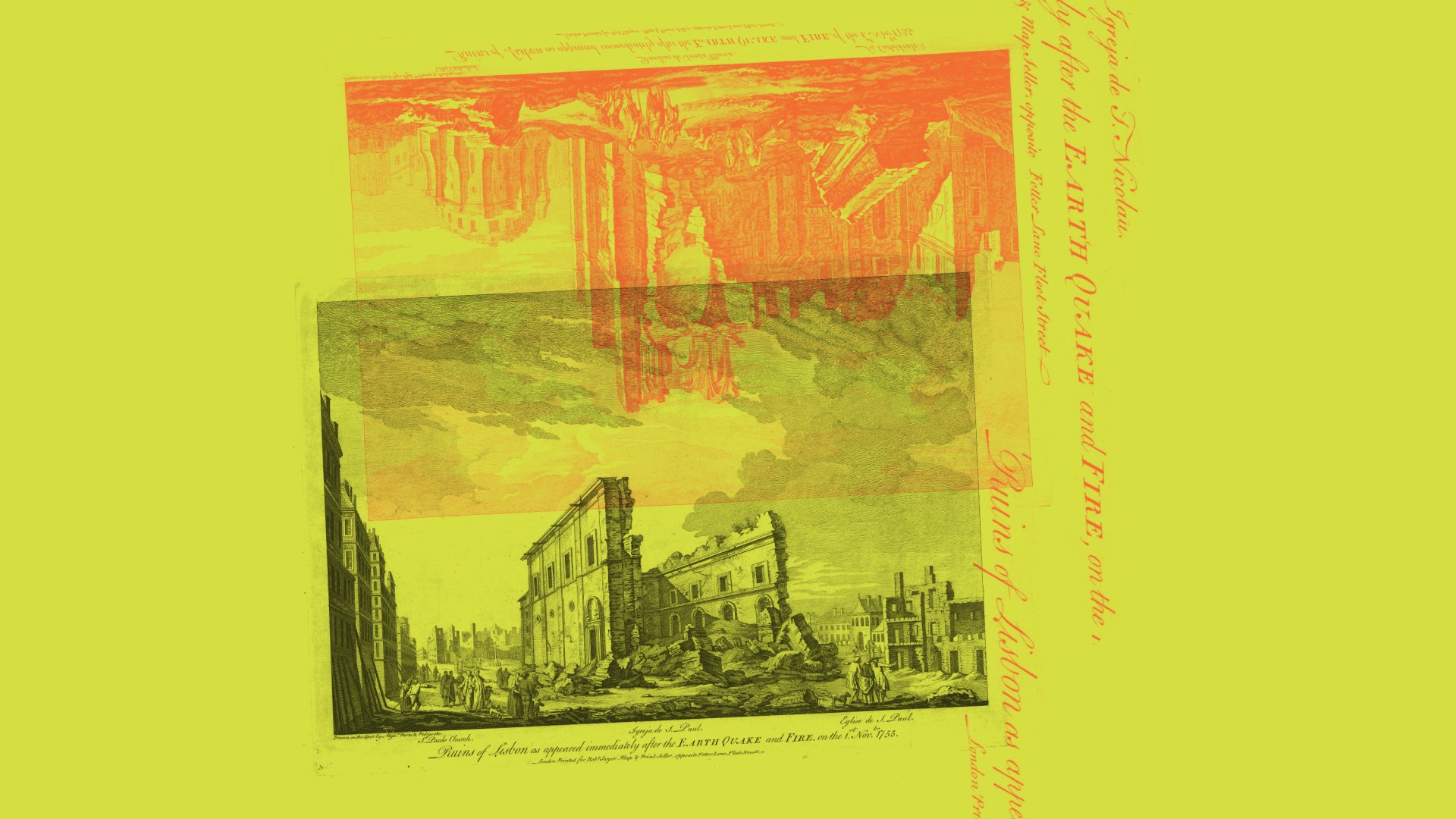November 1, 1755, was a sunny day in Lisbon. One of the busiest trading ports in Europe, the Portuguese city was both fabulously wealthy and extremely religious. It was a center for trading goods and, abhorrently, slaves. The city and those who did business there profited greatly from that industry.
Lisbon also had 40 parish churches, 90 convents, and 150 associated brotherhoods and religious societies; more than 10 percent of Lisbon’s residents were members of a religious order.
November 1 was also All Saint’s Day, and the many churches of Lisbon were filled with parishioners for the second mass of the day, around 9 a.m., when a giant earthquake struck.
The earthquake was large enough to be felt across much of western Europe and northwest Africa. It triggered a tsunami, with waves observed as far away as England, and then a fire that destroyed much of what had been left standing.
When all was said and done, 10 percent of the population of Lisbon had died, and almost every important church in the city had been destroyed.
Then, as now, people assumed there was meaning in tragedy and sought to explain it based on the nature of the world or the failure of humans to do right. And both meaning and God’s judgment are there—but not, perhaps, in the ways we expect.
 Jacques-Philippe Le Bas / Wikimedia
Jacques-Philippe Le Bas / WikimediaA tidy, positive view of the world prevailed during the Enlightenment. Philosophers in the 18th century argued that the universe was ordered according to a consistent set of rules. By observing nature and using one’s reason, they said, God’s ways could be deduced. God could thus be known through the orderly world.
In his 1710 book Theodicy, Gottfried Wilhelm Leibniz argued that the world that God created was good enough to excuse the occurrence of occasional evils; indeed, this world we have is the “best of all possible worlds.”
Any good world might, in his understanding, contain tragedy, but the goodness outweighed the sorrow. Leibniz wasn’t arguing that events that seemed to be bad were in fact right, but that any alternate reality would be worse, even if it didn’t have the same problems as ours.
And we could depend on the world to be only, exactly, as God designed. If God were a clockmaker, then the clocks worked as God intended. People who saw room for improvement were in error; God fashioned perfect clocks, and the kind of perfection critics demanded wasn’t, in fact, perfection.
So too with creation: It was as it was intended to be. If we could not always discern the good meaning in it, goodness was nevertheless there.
Alexander Pope’s Essay on Man affirms these principles:
All Nature is but Art, unknown to thee;
All Chance, Direction, which thou canst not see;
All Discord, Harmony not understood;
All partial Evil, universal Good.
And, spite of Pride, in erring Reason’s spite,
One truth is clear, “Whatever is, is right.”
This view of events led to a spirit of optimism about human affairs: Nothing could really go wrong. Indeed even the word optimisme was coined in 1733 to describe, as literature professor Nicholas Shrady writes, the “spirit of the age.”
So the spirit of the age left Enlightenment Europeans under the impression that they could figure out the explanation for anything, and that it would be a satisfying explanation.
You can imagine the distress that set in when a natural disaster of biblical proportions hit the city of Lisbon only 20 years after “optimisme” came to be. How could anyone dismiss such destruction as “partial evil” in the service of “universal good”?
Certainly the Lisbon earthquake and its immense, unfair damage was not the best of all possible worlds. Would not the best of all possible worlds have prevented thousands of men, women, and children from being killed in church during an earthquake? Indiscriminate death and destruction rightly do not fit in any optimistic view.
Rather than leading to optimism, a view of this world and its course of events as our best (and only) option could just as easily lead to a fatalism about human affairs.
In this way, surprisingly, deism—in which God set things in motion and stopped intervening—and fatalism—in which neither humans nor even God can affect the course of events—are closely related, as they present God as removed from human outcomes.
This would lead us to think it’s no good appealing to God or getting all worked up when bad things happen. Whether God intends all that happens or whether he is not at all involved in what happens, whatever is, will be.
As with optimism, fatalism can’t satisfy the outrage and grief we feel when we see calamity strike the obviously innocent. Would pessimism suffice? Such an approach to the Lisbon earthquake is where Voltaire landed. He wrote his famous “Poem on the Lisbon Disaster” and articulated the famous three-pronged dilemma that has occupied theologians ever since: If God is good, and God is powerful, then how did this hellish thing happen?
If whatever is, is right, then God is a bad dude. Or we can dismiss the idea of a sovereign God.
In Voltaire’s words,
Come philosophers who cry “All is well,”
And contemplate the ruin of this world…
As the dying voices call out, will you dare respond
To this appalling spectacle of smoldering ashes with:
“This is the necessary effect of the eternal laws
Freely chosen by God?”
Voltaire rightly rejected Leibniz’s consolation that this was “the best of all possible worlds.” He—and others—weren’t able to suppress their judgment that the Lisbon earthquake should not have happened if all were well. If this is the best of all possible worlds, show me the others!
A theodicy that could explain disaster did not have to involve an unjust or unsovereign God. Despite Voltaire’s objections, viewing Lisbon’s catastrophe as God’s direct response to its sins made for a tidy narrative, one in which God was still righteous and in control.
In particular, it was easy for Protestant figures to call the disaster a divine judgment on Catholic Lisbon. Almost every important Catholic church in the city had been destroyed by a cataclysmic conflation of earthquake, water, and fire. The Estaus Palace, headquarters of the Portuguese Inquisition, was also destroyed. The enormous wealth of Lisbon and its participation both as a center for the Inquisition and for the slave trade made it a particularly ripe candidate for blame. The optics were just too tempting.
Religious figures of the day found the biblical parallels irresistible. God had destroyed the earth once before with a flood (with Noah, in Genesis 7) and had also used fire to burn a sinful city (with Sodom, in Genesis 19). Earthquakes are sometimes portended as a sign of divine judgment in the Bible (Luke 21:11).
So it is not surprising that figures like John Wesley interpreted the event as a sign of God using natural means to assign judgment. His brother, Charles Wesley, even wrote a hymn based on the events, commemorating God’s judgment in song:
Woe! To the men, on earth who dwell,
Nor dread th’ Almighty frown,
When God doth all his wrath reveal,
And shower his judgments down!
Sinners, expect those heaviest showers,
To meet your God prepare,
When lo! The seventh angel pours
His vial in the air!
Shrady notes that “neither the burning of Rome or London nor the sacking of Carthage or Constantinople” was equal to Lisbon’s destruction.
It was not only Protestants who drew the conclusion that God was punishing Lisbon for spiritual unfaithfulness. The Jesuit missionary Gabriel Malagrida also forcefully declared the Lisbon earthquake to be a sign of God’s wrath:
Learn, O Lisbon, that the destroyers of our houses, palaces, churches, and convents, the cause of death of so many people, and the flames that devoured vast treasures, are your abominable sins, and not comets, stars, vapors, and exhalations, and similar natural phenomena.
Making comparisons to Sodom and Gomorrah or Jericho seemed obvious.
For the most part, modern people reject the view that natural disasters are divine judgment. We are less likely than in some past eras to preach sermons or write hymns about the fittingness of God destroying the world through an earthquake.
 Jacques-Philippe Le Bas / Wikimedia
Jacques-Philippe Le Bas / WikimediaWe believe we know how to discern a divine act from anatural one, and we believe we prefer scientific explanations to supernatural ones.
And yet “natural disasters” do reveal something about the human situation and God’s rightful judgment of it.
Though we are reticent to consider divine judgment to be the cause of human disaster, or to think of disasters as being sent to punish people, we can still say that such events can reveal truths when they occur. What is revealed, often, is what we believe about God and each other and how we have failed to follow God’s commandments.
There are two meanings of the word judgment to understand.
The first is a negative series of events that God deploys because he is angry at the recipients. This form of judgment is targeted and proportional. This is the judgment one imagines with fire and brimstone and eternal torment. All things considered, those who are affected by this kind of divine judgment deserve it.
This sort of judgment does happen in the real world. The first example is in the story of Noah. We are told that the wickedness of humans had increased to intolerable levels: “So God said to Noah, ‘I am going to put an end to all people, for the earth is filled with violence because of them. I am surely going to destroy both them and the earth’” (Gen. 6:13).
Though God promises never again to destroy humankind through a flood, there are further examples of disaster as judgment for sin. God destroys Sodom through an ordained natural disaster (Gen. 19).
Judgment in this sense is not usually a helpful lens to describe devastating modern events. It is also usually an incorrect theological lens. Jesus himself rejects such a line of thinking in John 9, where he contradicts sin as a reason for a man’s blindness.
Think also of the Book of Job, where the text says that God found Job righteous and faithful before the deaths of his children, the loss of his wealth, and his suffering from disease (1:8).
Near the end of the book, God tells Job’s friends that he was angry with them “because you have not spoken the truth about me” when they reasoned that Job’s sin was the explanation for the disasters he endured (42:7).
It is never theological best practice to interpret tragic human events as the result of sufferers’ sins. As Job’s friends learned, God may be far from pleased when people use calamity—such as a cancer diagnosis or a flood—as evidence that someone needs to repent.
However, in the Old Testament, God did send messages that he would bring judgment as punishment if people did not change their behavior. For example, many prophets, including Jeremiah (Jer. 21:11–14), prophesied a direct connection between people’s behavior and a specific punishment that would follow, such as exile. In such an instance, when God warns a community through the prophets, tragedy can be attributed to divine judgment.
But this is not the only meaning judgment can have. The second form of judgment is an evaluation. One makes a judgment after a restaurant dinner or an oral defense for a master’s degree, evaluating the conditions and presentation that one observed.
People might also make judgments after they are caught driving intoxicated—realizing, perhaps, that their drinking has gotten out of hand or that they need help.
Judgment in this sense is less a punishment and more a revelation of the conditions that already exist. It is where we gain a new, realistic perspective. It can be a turning point.
In this way, a devastating event can reveal something we needed to know that needs to be addressed. The daily drink seemed harmless before; after a DUI, we see it as part of habitual overconsumption that demands action.
We might call this second form of judgment “judgment-for-revelation.” Judgment-for-revelation might allow us to discern important things about God, ourselves, and the world because of a tragedy.
Though theologians are quick to separate the reality of “natural” and “moral” evil (a tsunami versus an invasion), it is often the case that natural disasters show human failure.
When an earthquake hits, people living in inadequate, temporary housing risk much greater loss. When hurricanes approach land, those without transportation and financial resources aren’t as able to quickly evacuate.
Consider that, when Hurricane Katrina hit Louisiana in 2005, Americans were properly outraged not at the “natural” part of the natural disaster but at the failures to govern well.
For example, a decades-long engineering project to protect New Orleans against the expected event of storm surges hadn’t been completed, despite the clear necessity. Four Category Three hurricanes and dozens of deaths occurred in the interim.
Racial disparities that preceded Hurricane Katrina were also apparent in disaster recovery. The scarcity of resources that plagued Black New Orleanians before the hurricane continued throughout the event itself in the form of inadequate resources for evacuation and rebuilding.
In this second sense of judgment-for-revelation, natural disasters can reveal things as they really are. Real lives are lost. Survivors experience real suffering. These aren’t drills. But they also don’t prove God’s weakness, absence, or callousness. Instead, they prove the quality—or lack thereof—of people’s stewardship.
Too often, leaders have been neglectful and exploitative, the poor have unjustly been left with only bad options, the engineering we trusted our lives with was fudged, and neighbors have failed to care for each other. Though we should learn from Jesus and from Job’s friends not to call hurricanes God’s punishment, Hurricane Katrina did serve as a revelation of how far we had fallen from our call to care for the poor and the oppressed (Isa. 1:17) and steward the earth (Gen. 1:28).
The citizens of Lisbon saw total destruction of their city. They discovered that their view of how the world worked was broken. They had thought that theirs was “the best of all possible worlds,” but now they had to consider what it meant to affirm that God was good and had created a good world.
It took events that pushed their theodicies to the limits to reveal the inadequate ways they thought about God’s power. This, too, is divine judgment.
 Jacques-Philippe Le Bas / Wikimedia
Jacques-Philippe Le Bas / WikimediaIn our own way, we have been through a season of disaster—a pandemic that has killed more than million people in the United States alone, destructive fires and devastating floods, significant social unrest, and eroding trust in social and political institutions.
The prevalent Enlightenment explanations for disaster—that it was an insignificant slip-up in a good world, a good thing if you could just look at it the right way, or just events set in motion by a neutral or helpless God—were not satisfying explanations. And the idea that God is punishing people whenever things go wrong is a too-satisfying explanation that is nevertheless usually incorrect.
We aren’t past these errors. In updated language, we too often claim that mass casualty events aren’t really big problems, that they must be faced without a trustworthy God, or that personal holiness (or some other characteristic) would have prevented them.
Just as the Lisbon earthquake collided with Enlightenment Europeans’ optimism and faith, so this season may have shaken our society. The coronavirus pandemic revealed how weakened the foundations of our confidence had become.
For some who prized their health and independence, this time has revealed how vulnerable and interdependent they actually are. Differences in preferences for risk, cooperation, and autonomy have led to broken relationships.
In this way, the pandemic—a “natural” event—has in fact served as a judgment. We might be shown something by this season of disruption, which has come as an unlikely left-handed judge (Judges 3).
We might see how much we have assumed our health would continue and that diseases would be easily addressed. We might see how much we have neglected community bonds and preferred our privacy and relationships of our own choosing.
But a truth about the world has been revealed to us in these years: All of us are deeply susceptible to disease, division, and the anguish that both can exacerbate.
A fissiparous people, we are quick to abandon community, quick to prefer our own comfort, and hasty to forsake the assembly of believers in every form it takes. We have not only preferred the company of those who agree with us but also rejected those who don’t.
We have in this way indeed found ourselves judged, as our churches empty and our communities are marked by loneliness. We are much more susceptible than we’d like to think. We have perhaps been judged by God, as our empty pews witness to a failure to bear with one another in love, to quickly forgive, and to embrace the ideological stranger.
The church goers of Lisbon found their religious celebrations interrupted by earthquake and fire. The great thinkers of their age found their basic beliefs about the world contradicted by water and flames.
We too may find that our greatest achievements—our technology, our models for church, our political systems—have been disrupted by natural events. Without seeing the pandemic as sent by God as a punishment, perhaps we can receive it as a revelation, and respond as those in need of repair.
Kirsten Sanders is founder of the Kinisi Theology Collective, a public theology project.














